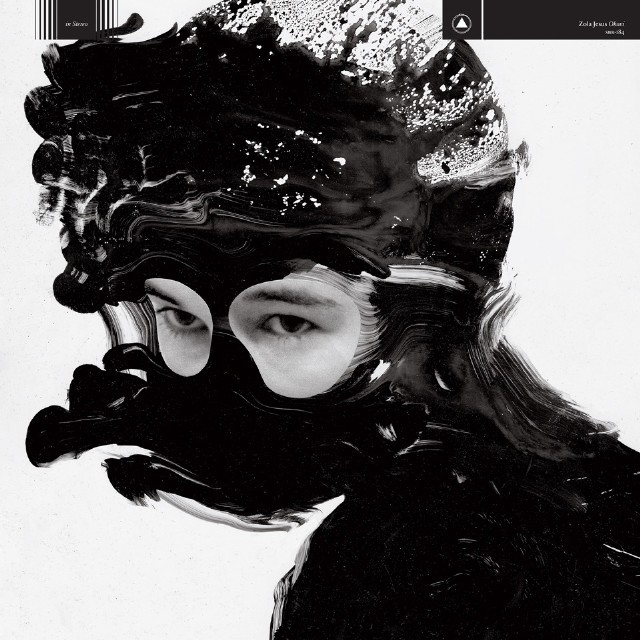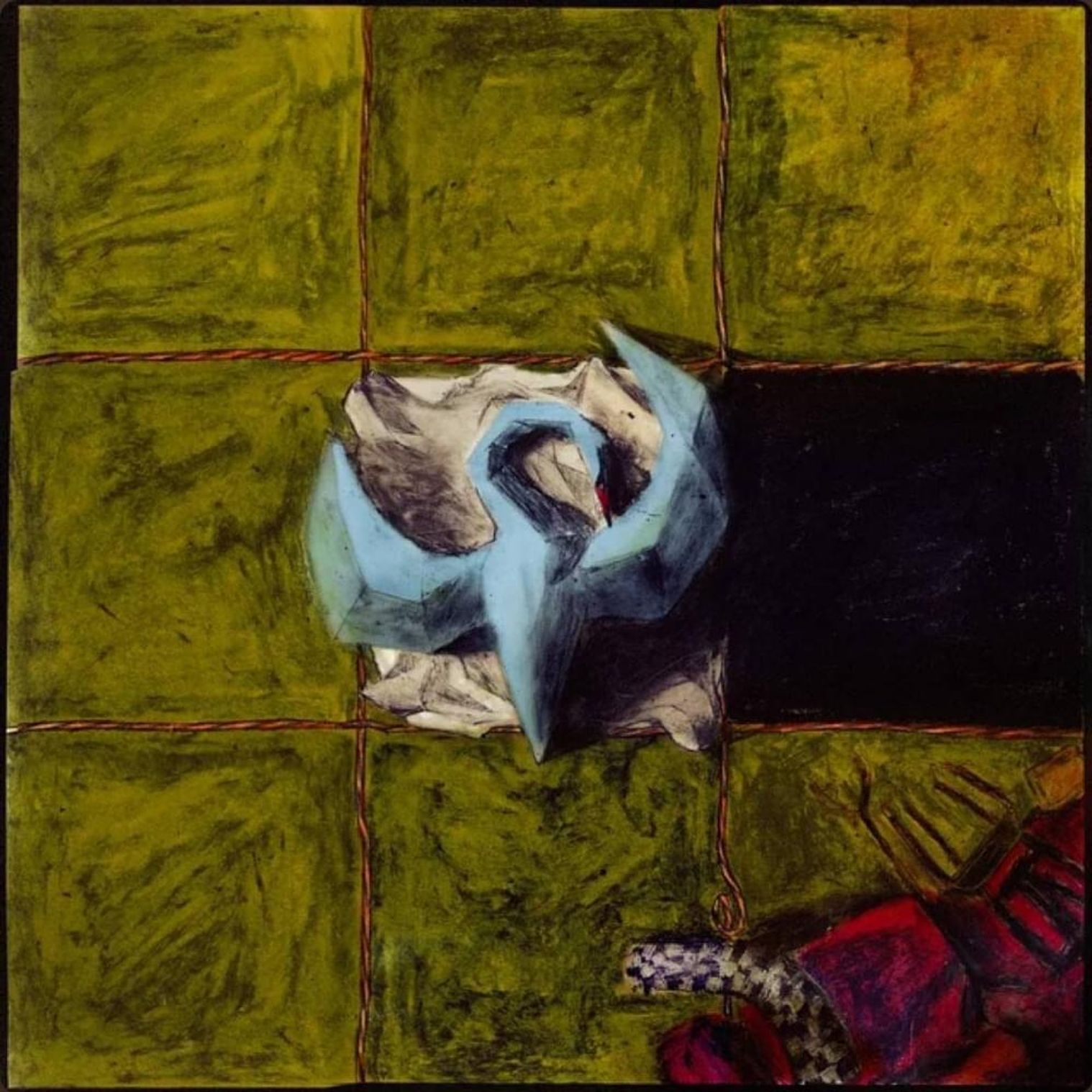Seven or eight years ago, I saw Nika Roza Danilova lift a mace over her head in a Chicago bar, and the image has stayed with me ever since. That night, Zola Jesus was opening for Fucked Up and Kurt Vile at Chicago's Empty Bottle, and I almost showed up late on purpose. At that point, the only Zola Jesus album was 2009's The Spoils, a squalid and seething noise record. I'd listened to it, and it didn't seem like something I needed in my life. But I did show up early enough to see Zola Jesus, and what I saw was huge and beautiful and overwhelming. Danilova was only tall enough that, even when she was standing onstage, I could barely see her over the heads of the people in the front row. But she emanated this sound, a lonely foghorn wail, that I've never heard another human being even attempt. She paced back and forth across that tiny stage like a caged tiger. And for one song, while the three guys behind her worked up a towering keyboard drone, she held that medieval weapon aloft, looking like she was about to go to war with the entire world. I've been to a lot of shows in my life, but I've never seen anyone project strength the way Danilova did that night.
Considering the whole narrative behind it, Okovi, the new Zola Jesus album, should not be a show of strength. When last we heard from Danilova, she'd signed to a bigger label, cleaned her sound up, and released Taiga, a dark and grandiose pop album. It wasn't a sellout move or anything; the album's idea of melody and majesty were a logical extension of what Danilova had already been doing. But Taiga was a bigger, sharper, more approachable version of that style. And even though it had a few great songs -- "Dangerous Days" still bangs -- it lost some of the feverish vitality that she'd once brought. Then she moved from Seattle back to middle-of-nowhere Wisconsin, the home she'd left. She returned to Sacred Bones, the label that had released all of her pre-Taiga music. Her hair became dark again; it had been luminous blonde for the past few records. She returned to the wrenching, swirling sound that had defined her best records, the 2010 EPs Stridulum and Valusia. Her new album is named after the Russian word for "shackles," and it's full of songs about sadness and death and suicide. Reading all that, you might expect Okovi to be a fragile album, a you-can't-go-home-again cautionary tale. Instead, Danilova is once again projecting the world-destroying strength that I saw from her that night in Chicago.
The first song on Okovi is "Doma," a hazy and impressionistic intro track that sounds a bit like Gregorian chant. It fades out after two minutes, and what it fades into is something very serious. "Exhumed," the album's second song, opens with enormous, spartan string-stabs. The beginning of that song could be the beginning of a hardcore techno track or a horror-movie theme. It could be the sort of thing that Lil Jon yells over. Instead, it leads into Danilova, a trained opera singer, howling, "Bury the tongue between the teeth / Open the jaw and sink in deep" over vast tribal-industrial drums. This is harsh, heavy, majestic, physical music. It grabs your gut, twists, doesn't let go.
Nothing else on the album pounds that hard, but all of it has the power to sweep you away. "Soak" has a chorus -- "Take me to the water / I am not free / But I am sorry / I am stone" -- that hits like a tidal wave. "Witness" is built on freezing strings that recall Björk's Homogenic. "Veka" has a dark synth pulse and a house-music drum pattern; it gives me flashbacks to '90s goth-rave miscreants like My Life With The Thrill Kill Kult. Even the quietest, most fragile songs are still vast and powerful. Danilova has never had the same commercial ambitions as, say, the Cure or Nine Inch Nails, but on this album especially, her music has the same sweeping, theatrical intensity. And her voice, an absolute force on its own, floats over these soundscapes and gives them shape and purpose.
As a lyricist, Danilova is interested in big ideas. She sings about solitude, about decay, about eternity. On "Remains," over a brittle breakbeat and a throbbing synth, she wonders what we'll leave behind for the rest of the world, how we might be remembered when we're gone: "Do ruins give us power? / Or do they give proof / That something meant more / Than what we lived through? / What remains of us?" On "Veka," she ponders the idea of what she's written outliving her: "When the words become you / When all you've ever said / Is all that will remain." But she also has more urgent things in mind. I hear "Witness" as a plea to a depressed friend to resist suicide: "Second chance to pull you from the wreckage of your mind / I'll do anything I can to rip you from the edge in time." "Siphon," which comes next, seems to be about something similar: "We'd hate to see you give into those cold, cold nights inside your head." This is music that stares into the abyss, but it's not music that dives in. It's music that engages with depression, that takes it head on, but I don't think it's depressed music.
When my daughter was an infant, I used to rock her to sleep to Zola Jesus. The music did the trick; it was slow and pretty and soothing enough to work as lullaby music. (It also helped keep me from getting too bored. Rocking babies to sleep is really fucking boring.) But maybe, on some level, I was hoping that the strength that I saw on that stage in Chicago, that thrummed through those early EPs, would imprint itself on her. (Maybe it has. I'd like to think so.) That strength is all over Okovi. It's an albums that crackles with its own sense of power even as it acknowledges the darkness all around. Infants or not, we could probably all use some of that right now.
Okovi is out 9/8 on Sacred Bones.
[videoembed size="full_width" alignment="center"][/videoembed]
[videoembed size="full_width" alignment="center"][/videoembed]
[videoembed size="full_width" alignment="center"][/videoembed]
Other albums of note out this week:
• The National's dark, stormy, urgent Sleep Well Beast.
• Ted Leo's purposeful, personal return The Hanged Man.
• Alvvays' delightful, glowing indie-popper Antisocialites.
• Lomelda's fragile, fractured DIY LP Thx.
• Former Vampire Weekend co-leader Rostam's solo debut Half-Light.
• Tori Amos' sweeping, rapturous Native Invader.
• Deerhoof's slipper, collab-heavy Mountain Moves.
• Julie & The Wrong Guys' fired-up self-titled debut.
• Death From Above's snorting rocker Outrage!
• Partner's swaggering rock debut In Search Of Lost Time.
• Burn's ripping post-hardcore return Do Or Die.
• The Dream Syndicate's long-awaited reunion album How Did I Find Myself Here?
• Alex Cameron's sleazy, synth Forced Witness.
• Faith Healer's straightforward retro-pop LP Try ;-).
• Sorority Noise side project Small Circle's full-length debut Cyclical.
• Sparks' erudite art-popper Hippopotamus.
• Carmen Villain's experimental pop debut Infinite Avenue.
• Mount Kimbie's atmospheric, downbeat Love What Survives.
• Nosaj Thing's thoughtful beat-music album Parallels.
• Chad VanGaalen's homegrown psych-popper Light Information.
• Nassau's slow, soothing Heron.
• The Safes' lo-fi garage-popper Tasty Waves.
• Grift's atmospheric black metaller Arvet.
• Argus' old-school prog-doom wallow From Fields Of Fire.
• Legendary Afrobeat drummer Tony Allen's solo album The Source.
• Gregg Allmann's posthumous LP Southern Blood.
• Neil Young's unearthed 1976 acoustic album Hitchhiker.
• The Twin Peaks: The Return soundtrack.
• The Bojack Horseman soundtrack.
• The all-covers compilation Covered In Gloria.
• Mourn's Over The Wall EP.
• Zomby's GASP! EP.






